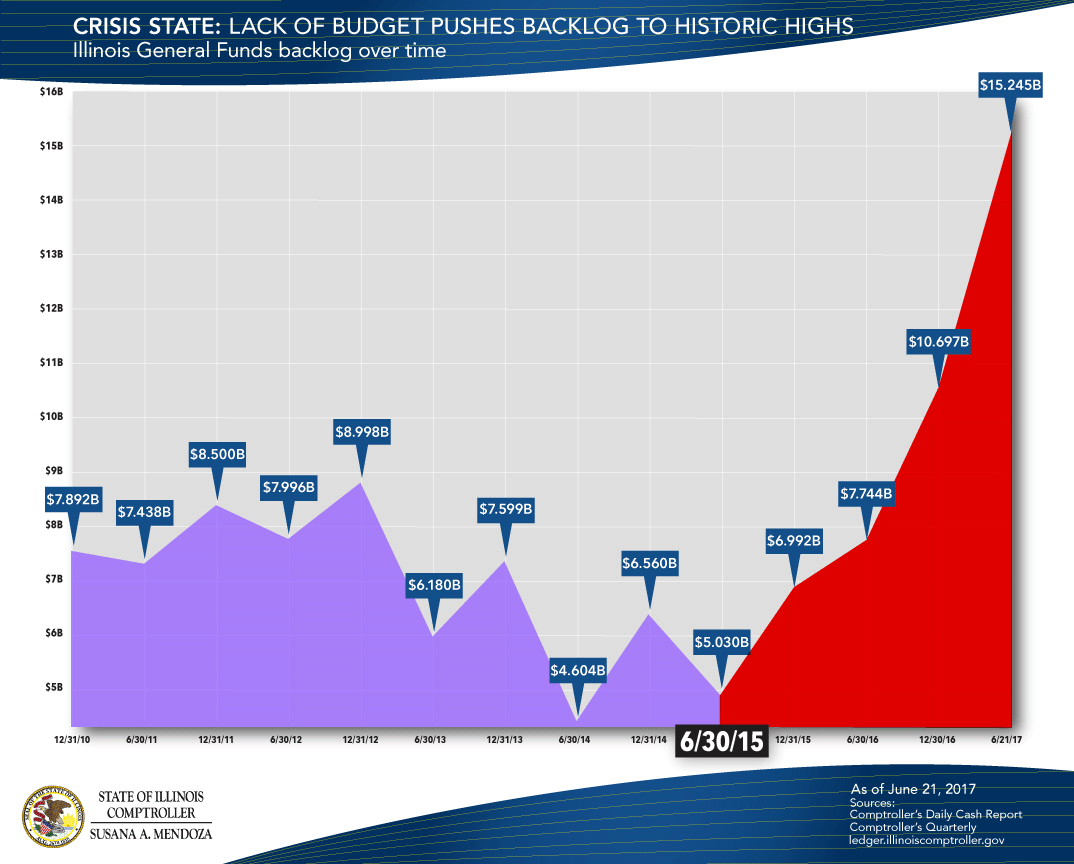After going over two years without any kind of fiscal plan, Illinois’ state government now has a budget after the state’s legislature overrode a veto by the state’s governor to impose large tax increases on the incomes of the state’s residents and corporations. Unfortunately, Illinois’ legislature made no effort to address the state’s biggest liabilities.
Must Read State Pension Crisis Leading to High-Tax Exodus
The Quad-City Times has the story:
Illinois finally has a budget plan after two years. Now, to start paying bills.
The Democratic-controlled Legislature’s vote last week to create a $36 billion framework over Republican Gov. Bruce Rauner’s vetoes ended the nation’s longest fiscal stalemate since at least the Great Depression. At the core of the budget was a $5 billion income tax increase.
The tax hike is retroactive to July 1, and the state could start seeing some additional money within weeks. But after unchecked “autopilot” spending that outstripped incoming revenue by $600 million a month, Illinois has a $14.7 billion jumble of overdue bills.
The tax increase also does nothing to directly address the haunting, $130 billion shortfall in pension obligations to retired and current state workers.
Illinois’ legislature pushed through the tax increase specifically to avoid the fate of becoming the first US state to have its credit rating cut to “speculative” or “junk” status. However, even after it budget passed its first hurdles toward becoming law, at least one major credit rating service notified the state that it was reviewing the state’s credit for a potential downgrade. Bloomberg‘s Elizabeth Campbell reports on the continuing risk that Illinois faces because the state legislature failed to enact reforms to fix its deteriorating long-term fiscal situation:
Illinois is at risk of becoming the first junk-rated US state on record even if lawmakers overturn Governor Bruce Rauner’s veto and enact a budget, Moody’s Investors Service said.
The state’s rating, one step above speculative grade, is “under review for possible downgrade” after Illinois’s leaders failed to enact a “timely budget” and come to a political consensus over how to solve the state’s financial challenges, Moody’s said in an emailed statement on Wednesday. The Senate overrode Republican Rauner’s veto of budget bills, including a $36 billion spending plan and tax hike, on Tuesday, and the House is scheduled to vote on override measures on Thursday.
The budget “appears to lack broad bipartisan support, which may signal shortcomings in its effectiveness once implemented,” Moody’s said. “So far, the plan appears to lack concrete measures that will materially improve Illinois’ long-term capacity to address its unfunded pension liabilities.”
In the short term, however, the passage of a budget in Illinois has reduced the cost of borrowing to the state over what it had risen to in recent weeks. Compared to other, more fiscally solvent states, however, it still costs Illinois over twice what they pay in interest rates for their general obligation debts.
A large portion of the state’s $36 billion budget will go toward paying its $15 billion backlog of unpaid bills.
Under the state government’s new budget, it will only pay down one-third of its balance of unpaid bills during the next year. At the same time, nearly $8 billion (over one-fifth) of the state’s budget will go toward paying the generous retirement benefits of current and former state government employees, while it is unclear if the state will have enough money to open its public schools on time for the 2017-2018 school year that is scheduled to begin next month.
Budgets are about priorities. Illinois’ new state government budget reflects the priorities of the state’s legislators, regardless of whether or not they are the same or are very different from those of the state’s residents.







